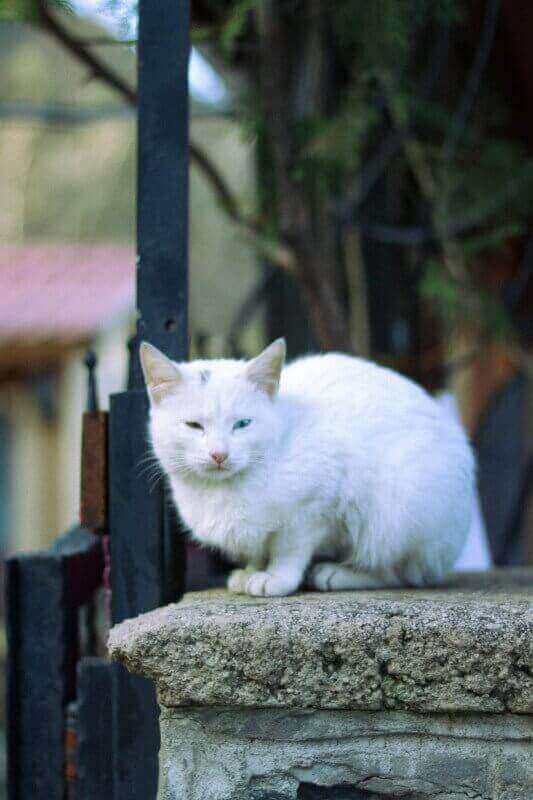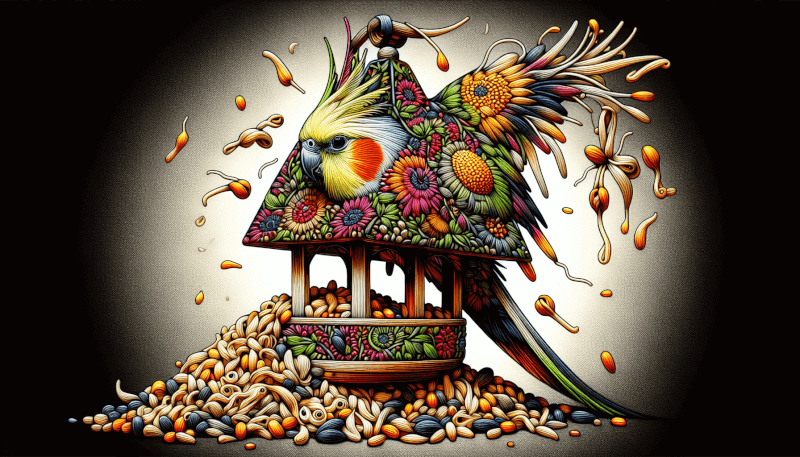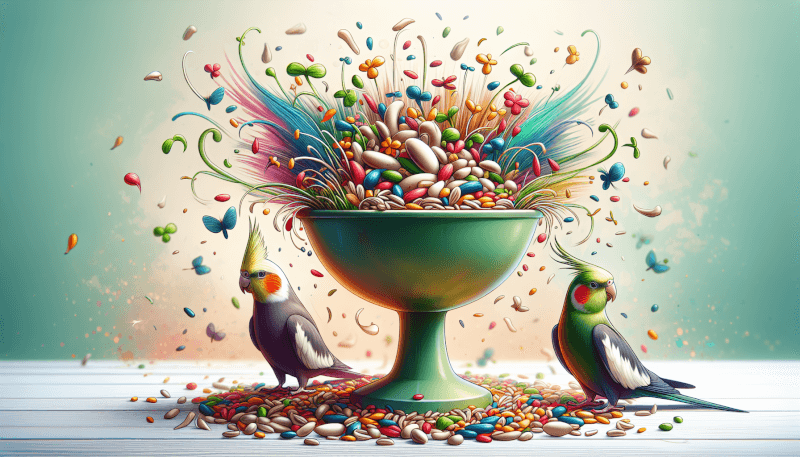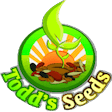If you’re a proud owner of a cockatiel, you know how important their nutrition is for their overall health and happiness. One way to enhance their diet is by including sprouting seeds in their meals. Sprouting seeds for cockatiels can provide an abundance of essential vitamins and minerals, while also adding variety to their daily routine. In this article, we will explore the benefits of sprouting seeds for cockatiels and offer tips on how to easily incorporate this nutritious option into their diet. Get ready to watch your feathered friend thrive with these delicious additions to their meals.

Why Sprouting Seeds is Beneficial for Cockatiels
Cockatiels, like many other pet birds, thrive on a diverse and nutritious diet. While commercially available bird seeds provide a basic foundation for their diet, sprouting seeds can offer additional nutritional benefits that contribute to their overall health and well-being. Sprouting seeds not only increase digestibility but also reduce the risk of contamination and cater to the cockatiels’ natural foraging instincts, making it a highly beneficial practice for their overall health and happiness.
Nutritional Benefits of Sprouting Seeds
Sprouting seeds unlock a wealth of nutrients that are otherwise dormant in their dry state. The sprouting process converts complex carbohydrates and proteins into their simpler, more easily digestible forms, enhancing the bioavailability of essential nutrients. By sprouting seeds, you are essentially increasing the overall nutrient density, including beneficial vitamins, minerals, and enzymes that support the cockatiels’ optimal health.
Increased Digestibility
One of the primary advantages of sprouting seeds for cockatiels is the increased digestibility they provide. During the sprouting process, the enzyme activity naturally breaks down complex molecules into simpler elements, making them easier for the birds to absorb and utilize. This not only ensures better nutrient absorption but also reduces the strain on their digestive system, promoting a healthy gut and overall digestion.
Reduces Risk of Contamination
Another significant benefit of sprouting seeds is the reduction in the risk of contamination. While commercially available bird seeds are typically well-packaged, there is still a possibility of them being exposed to contaminants. By sprouting your own seeds, you have greater control over the sourcing and handling process, minimizing the risk of harmful bacteria, mold, or other toxins that could be detrimental to your cockatiel’s health.
Satisfies Cockatiels’ Natural Foraging Instincts
Cockatiels are natural foragers, spending hours each day in the wild searching for food. By sprouting seeds, you are replicating their natural foraging instincts and providing them with mental stimulation and physical exercise. Sprouted seeds offer a variety of textures, smells, and tastes, making their mealtime more engaging and exciting. This not only provides enrichment for your cockatiel but also helps prevent boredom and the development of destructive behaviors.
Types of Seeds Suitable for Sprouting
When it comes to sprouting seeds for your cockatiel, it’s important to choose varieties that are safe and nutritious. While there are numerous options available, here are some of the most common seeds that are suitable for sprouting:
Millet Seeds
Millet seeds are a popular choice for sprouting as they are easy to find and highly nutritious. They are rich in essential amino acids, vitamins, and minerals, providing a well-rounded diet for your cockatiel.
Quinoa Seeds
Quinoa seeds are an excellent source of protein and contain all the essential amino acids your cockatiel needs. They are a suitable option for sprouting and add variety to their diet.
Amaranth Seeds
Amaranth seeds are tiny powerhouses of nutrition, packed with vitamins, minerals, and antioxidants. Sprouting amaranth seeds can provide your cockatiel with an extra dose of nutrients.
Pumpkin Seeds
Pumpkin seeds are not only tasty but also offer numerous health benefits. They are a good source of protein, healthy fats, vitamins, and minerals, contributing to your cockatiel’s overall well-being.
Sunflower Seeds
Sunflower seeds are a favorite among cockatiels and can be sprouted to enhance their nutritional content. They contain essential fatty acids, protein, and various vitamins and minerals that support optimal avian health.
The Sprouting Process
Sprouting seeds for your cockatiel is a relatively simple process, but it requires careful attention to ensure maximum safety and nutritional value. Here’s a step-by-step guide to help you through the sprouting process:
Rinsing the Seeds
Start by rinsing the seeds thoroughly under running water to remove any dirt or debris. Use a fine mesh sieve or colander to ensure the seeds are properly cleaned.
Soaking the Seeds
Place the rinsed seeds in a clean container and cover them with room temperature water. Allow them to soak for the recommended period of time, usually overnight or as specified by the seed variety.
Draining and Rinsing
After soaking, drain the water from the seeds and rinse them again under running water. Ensure that all excess water is drained away to prevent mold or bacterial growth.
Sprouting Timeframes
Different seeds have varying sprouting timeframes, so it’s essential to refer to specific guidelines for each seed variety. Generally, sprouting will occur within a few days, but some seeds may take up to a week. Monitor the progress of your sprouts and ensure they are healthy and vibrant before feeding them to your cockatiel.
Sprouting Techniques
There are several methods you can use to sprout seeds for your cockatiel, depending on your preferences and available resources. Here are some common sprouting techniques:
Jars and Screens Method
This method involves using a glass jar with a screen or mesh lid. After soaking the seeds, they are placed in the jar and covered with the screen lid. Rinse and drain the seeds twice a day, ensuring proper ventilation to prevent excessive moisture buildup.
Hemp Bag Method
The hemp bag method utilizes a breathable bag made of hemp or similar material. Soaked seeds are placed in the bag, and it is hung or placed in a well-ventilated area. Rinse and drain the seeds twice a day, ensuring they remain moist but not waterlogged.
Terracotta Tray Method
In this method, a terracotta tray is used to sprout seeds. Soaked seeds are spread evenly on the tray, and it is placed in a shallow amount of water. As the water slowly evaporates, it creates a humid environment that promotes sprouting. Rinse and drain the seeds regularly, ensuring they are not submerged in water.
Automatic Sprouters
For those who prefer a more hands-off approach, automatic sprouters are available on the market. These devices provide controlled conditions and automatically rinse and drain the seeds at appropriate intervals. They are convenient and ensure consistent results but may come at a higher cost.

Precautions and Safety Measures
While sprouting seeds offer numerous benefits, it’s important to follow precautions and safety measures to ensure the health and well-being of your cockatiel. Here are some essential considerations:
Using High-Quality Seeds
Ensure that you are using fresh, high-quality seeds specifically intended for sprouting. Avoid seeds treated with pesticides or other chemicals, as they can be harmful to your bird. Purchase seeds from reputable sources to minimize the risk of contamination.
Avoiding Contaminated Water
Always use clean, filtered water for soaking and rinsing the seeds. Tap water may contain chlorine or other impurities that can be harmful to your cockatiel. If you are unsure about the quality of your tap water, consider using filtered or bottled water instead.
Proper Ventilation and Air Circulation
Proper ventilation is crucial during the sprouting process to prevent the growth of molds or bacteria. Ensure that your sprouting area has adequate air circulation to minimize the risk of contamination. Avoid placing sprouting containers in areas with high humidity levels or stagnant air.
Hygiene and Cleanliness
Maintaining a clean and hygienic sprouting environment is paramount to your cockatiel’s health. Wash your hands thoroughly before handling the seeds or sprouts, and sanitize all sprouting equipment regularly. Discard any sprouts that show signs of spoilage or mold.
Introducing Sprouted Seeds to Cockatiels
Introducing sprouted seeds to your cockatiels requires a gradual transition to help them adjust to the new food item. Follow these steps to successfully incorporate sprouted seeds into their diet:
Gradual Transition Period
Start by offering a small amount of sprouted seeds alongside their regular seeds. Monitor their response and gradually increase the proportion of sprouted seeds over time. This allows their digestive system to adapt to the new food and prevents any potential digestive upset.
Mixing with Regular Seeds
To make the transition smoother, mix the sprouted seeds with their regular seeds. This ensures that they continue to receive a balanced diet while gradually adjusting to the new texture and taste of the sprouts. Gradually decrease the proportion of regular seeds as your cockatiel becomes more accustomed to the sprouted seeds.
Monitoring Cockatiels’ Response
Observe your cockatiels’ response to the sprouted seeds closely. Some birds may take to them immediately and eagerly consume them, while others may require more time to develop a liking for the new food. Be patient and persistent, as it may take several attempts before they fully accept the sprouts as part of their diet.
Adjusting Quantity
As your cockatiels become accustomed to sprouted seeds, you can adjust the quantity according to their preferences and nutritional needs. Always monitor their overall diet and ensure they are receiving a balanced mix of nutrients from a variety of sources.

Additional Nutritional Supplements for Cockatiels
While sprouted seeds provide a wealth of nutrients, it’s important to offer your cockatiel a well-rounded diet that includes additional nutritional supplements. Here are some other beneficial foods to consider:
Fresh Fruits and Vegetables
Introduce a variety of fresh fruits and vegetables into your cockatiel’s diet. These provide essential vitamins, minerals, and antioxidants that support their overall health. Offer a diverse range of options, including leafy greens, carrots, berries, and citrus fruits, to ensure they receive a wide spectrum of nutrients.
Vitamin and Mineral Supplements
Supplements can be added to your cockatiel’s diet to fill any potential nutritional gaps. Consult with a veterinarian or avian nutritionist to determine the appropriate type and dosage for your bird. These supplements can offer additional support for their immune system and overall well-being.
Calcium Sources
Calcium is essential for healthy bones, beaks, and egg-laying females. Offer calcium-rich foods such as cuttlebones, mineral blocks, and dark leafy greens like kale or collard greens. Ensure these sources are readily available to your cockatiel as a regular part of their diet.
Protein-rich Foods
In addition to sprouted seeds, provide your cockatiel with protein-rich foods such as cooked eggs, legumes, or small portions of lean cooked meat. These foods offer necessary amino acids for their growth, feather development, and overall vitality.
Monitoring Cockatiels’ Health and Overall Condition
Regular monitoring of your cockatiel’s health is essential to ensure they are thriving on their diet and to identify any potential issues early on. Keep a watchful eye on the following aspects:
Observing Eating Habits
Pay attention to your cockatiel’s eating habits, ensuring they are consuming their regular seeds as well as the sprouted seeds and other supplementary foods. Any sudden changes in their appetite or reluctance to eat should be investigated further.
Assessing Feathers and Skin
Check your cockatiel’s feathers and skin regularly. Healthy cockatiels should have bright, vibrant feathers, free from bald patches, excessive molting, or signs of feather plucking. Inspect their skin for any redness, sores, or signs of irritation.
Checking Droppings
Monitor your cockatiel’s droppings to ensure they are consistent in color, texture, and frequency. Any significant changes, such as excessively watery droppings or abnormal discoloration, could indicate a potential health issue.
Regular Vet Check-ups
Schedule regular veterinary check-ups to assess your cockatiel’s overall health. Avian veterinarians can perform thorough examinations, conduct appropriate tests, and provide tailored dietary recommendations to keep your cockatiel in optimal health.

Common Issues and Troubleshooting
Occasionally, you may encounter certain issues during the sprouting process or when introducing sprouted seeds to your cockatiels. Here are some common problems and troubleshooting tips:
Mold or Spoilage
If you notice mold or spoilage on your sprouts, discard them immediately. To prevent mold growth, ensure proper ventilation during the sprouting process, rinse and drain the seeds thoroughly, and maintain clean sprouting containers.
Seeds Not Sprouting
If your seeds are not sprouting, ensure they are fresh and of good quality. Check if the temperature or humidity conditions are suitable for sprouting. Adjust the soaking and rinsing frequency as necessary, and ensure there is adequate airflow to prevent stagnation.
Cockatiels Not Eating Sprouted Seeds
Some cockatiels may be hesitant to try new foods, including sprouted seeds. Be patient and consistent in offering the sprouts, and mix them with their regular seeds to encourage acceptance. You may also try offering the sprouts in a creative manner, such as incorporating them into foraging toys or hiding them in their cage.
Allergic Reactions
In rare cases, cockatiels may develop allergic reactions to specific sprouted seeds or other foods. If you observe any unusual symptoms such as difficulty breathing, swelling, or extreme lethargy, discontinue the food immediately and seek veterinary assistance.
Conclusion
Sprouting seeds for cockatiels offers numerous nutritional benefits and enhances their overall well-being. By providing increased digestibility, reducing the risk of contamination, and satisfying their natural foraging instincts, sprouted seeds contribute to a healthier and happier life for your cockatiel. Supplementing your cockatiel’s diet with fresh fruits, vegetables, and other nutritional sources further supports their optimal health. Regular monitoring, check-ups, and troubleshooting ensure that any potential issues are addressed promptly, and a balanced diet combined with sprouted seeds builds a strong bond between you and your beloved cockatiel.


